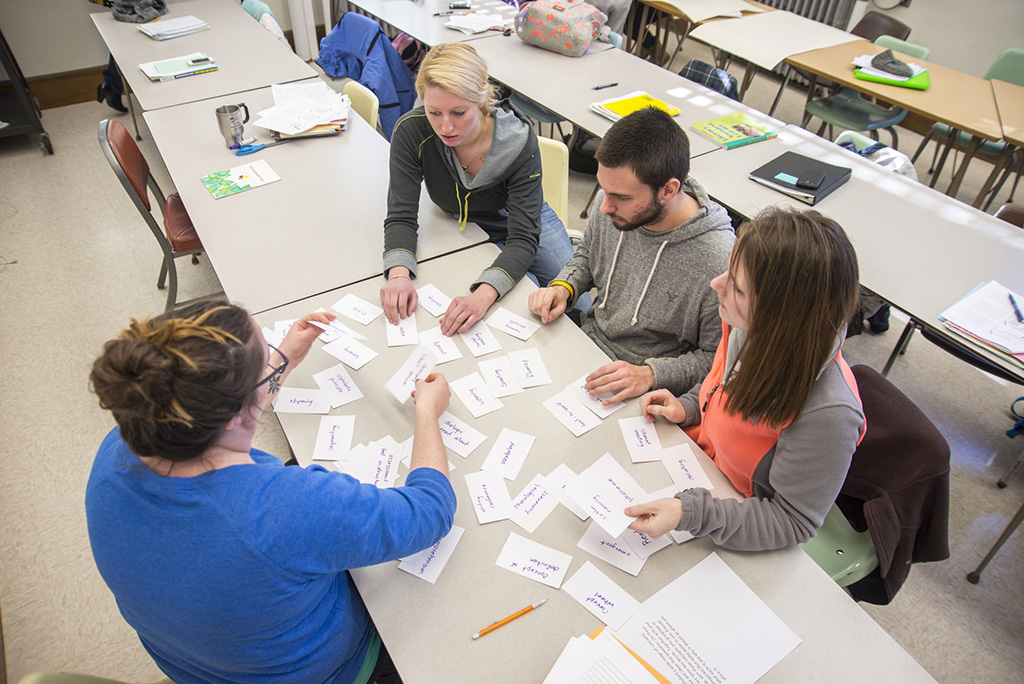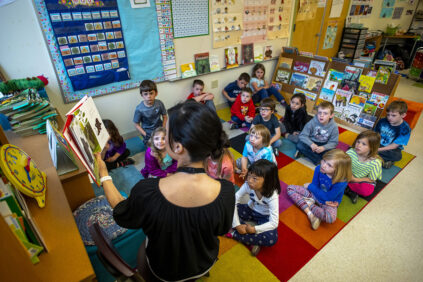Literacy Education (M.Ed., Ed.S.)
Degree overview
The University of Maine’s literacy education graduate programs provide the opportunity to explore vital issues of literacy research and instruction with nationally recognized faculty. The programs are designed to engage students in authentic and practical experiences, including working directly with young children, K-12 students and adults, conducting research in field settings, or developing their own writing skills in summer writing institutes. Depending on your career goals, our programs can lead to state of Maine certification as a literacy specialist. Graduates emerge as strong advocates for literacy in their schools and communities.
Careers in literacy education
Graduates of our programs become leaders in literacy in their own schools as knowledgeable teachers, curriculum coordinators, literacy specialists, literacy coaches and school administrators with a strong understanding of the demands of current literacy curricula.
Program delivery
Our master’s (M.Ed.) programs are designed to guide experienced educators to a deeper understanding of literacy learning and teaching, including establishing in K-12 students a firm foundation of how print works and strategic behaviors that lead to successful reading and writing. The curriculum covers how individuals develop literacy skills and knowledge, as well as how to shape and assess instruction that meets the unique needs of all learners. Our graduate programs align with Maine Department of Education requirements for literacy specialist and other professionals, as well as as well as the standards of organizations such as the Council for the Accreditation of Educator Preparation (CAEP), the Interstate Teacher Assessment and Support Consortium (InTASC), the International Society for Technology in Education (ISTE), the International Literacy Association (ILA) and the National Board for Professional Teaching Standards (NBPTS).
Students seeking an M.Ed. in literacy education have two options
- M.Ed., Literacy Specialist: Leads to eligibility to become certified as a K-12 Literacy Specialist in Maine (092 endorsement). This 36-credit program covers the collaborative nature of the literacy specialist and how this interventionist is key to supporting the literacy needs of schools. The curriculum includes courses in educational research, literacy and language development, linguistic diversity and multilingualism in the classroom, and intervention design for struggling readers.
- M.Ed., Individually Designed: This 33-credit program offers some flexibility to educators interested in graduate study of literacy in K-12 schools and other community settings. Although it does not lead to certification or licensure, students can build a program of study in consultation with a faculty advisor and the program coordinator that meets their unique needs and interests.
Education Specialist (Ed.S.), Literacy Education
For students who want to continue their studies beyond the master’s level, we offer an Ed.S. degree, an individually designed program that combines advanced coursework in specific areas of literacy with other professional and academic areas, such as human development, psychology, language and literature, research, and administration and supervision.
Tuition and fees
For current information about tuition and fees, please visit the Bursar’s office.
To apply
Applicants for the master’s programs must have a bachelor’s degree in education or a related field. At least two years’ successful experience teaching or working in another educational setting is strongly preferred. Applicants for the Ed.S. must have a master’s degree. We will accept up to 15 hours of transfer credits from any accredited Reading Recovery program. All degrees have a rolling admissions deadline and applications are processed through the University of Maine Graduate School.
For more information on how to apply, contact Graduate Program Coordinator Susan Bennett-Armistead, susan.bennett-armistead@maine.edu.
National Council for State Authorization Reciprocity Agreements (NC-SARA) statement
This program will prepare students to be eligible for licensure within the State of Maine. Visit the UMS State Authorization & Licensure page to learn more about the licensure requirements in other states and territories, in addition to the contact information needed to inquire further into the licensure requirements associated with this program.
Request Information
Literacy faculty
Susan Bennett-Armistead, Ph.D., Graduate Program Coordinator, Associate Professor of Early Literacy
Timothy Reagan, Ph.D., Literacy Program Coordinator, Professor of Foreign Language Education
Debra Lewis Hogate, Maine Partnerships in Comprehensive Literacy Trainer
Rich Kent, Ph.D., Professor Emeritus of Literacy
William “Dee” Nichols, Ph.D., Professor


